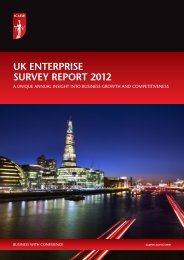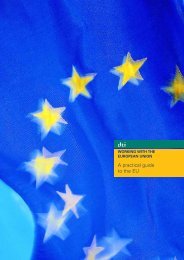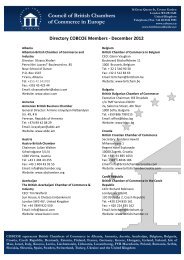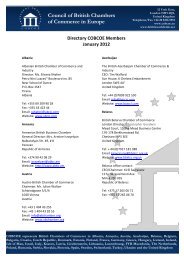Free Movement of Goods - Gov.uk
Free Movement of Goods - Gov.uk
Free Movement of Goods - Gov.uk
Create successful ePaper yourself
Turn your PDF publications into a flip-book with our unique Google optimized e-Paper software.
external frontier <strong>of</strong> its own, so that goods entering and leaving the Internal Marketare taxed at the same rate and go through the same processes and proceduresbefore entering the Internal Market. This requires Member States’ customsservices to apply a common customs tariff and standardised customs proceduresto goods entering and leaving the EU.This standardisation <strong>of</strong> customs procedures is the basis <strong>of</strong> the EU CustomsUnion. It is essential for the functioning <strong>of</strong> the Internal Market. Furthermore,customs controls need to strike the right balance between facilitating import andexport trade while at the same time regulating and controlling the importation andexportation <strong>of</strong> goods.All EU Member States are part <strong>of</strong> the EU Customs Union. A customs union hasalso been established between the European Union and Turkey, Andorra, SanMarino and Monaco. Additionally, the four EFTA countries (Norway, Iceland,Lichtenstein and Switzerland) have agreements with the EU that allow them toparticipate in the Internal Market and benefit from the free movement <strong>of</strong> goods.These arrangements expand the area within which goods can move freelybeyond the territory <strong>of</strong> the EU.Scope <strong>of</strong> EU Competence on the Customs UnionThe Customs Union is an area <strong>of</strong> exclusive EU competence, meaning thatvirtually all legislation in this area is EU legislation that has been initiated by theEuropean Commission. Most <strong>of</strong> this legislation is contained in EU Regulationsand is therefore ‘directly applicable’, which means it is law in all EU MemberStates. However some legislation is needed at national level in order toimplement EU customs law.The current EU Customs Code and its Implementing Provisions set out the rulesfor importing and exporting goods and impose legal requirements and obligationson importers and exporters. Businesses that engage in international trade, orindividuals that import or export goods privately, must comply with both EuropeanUnion and national legal requirements. A new EU customs code (the UnionCustoms Code) is currently being negotiated.Scope <strong>of</strong> UK National Competence in Customs MattersEU Member States are responsible for managing their own customs services andimplementing and enforcing EU customs legislation. The UK decides whichgovernment department or agency is the competent authority in the UKresponsible for implementing and enforcing particular Regulations. The UK alsodecides the nature and level <strong>of</strong> penalties that will be applied in the case <strong>of</strong> abreach <strong>of</strong> EU customs regulations that occurs in the UK. Customs criminal7








